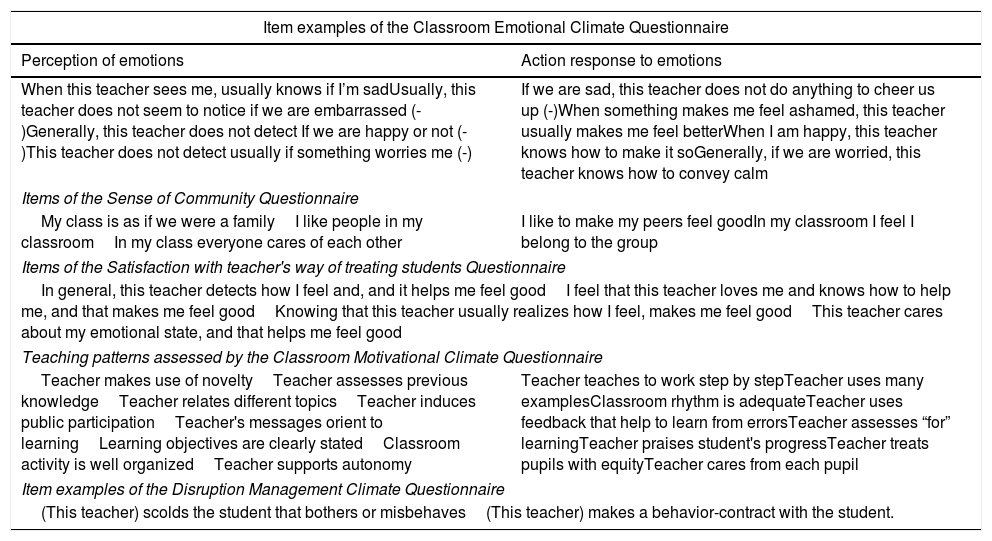Classroom emotional climate (CEC) is a variable that is been connected with academic skills, satisfaction, psychological wellbeing. However, its definition, the limits of the construct and the relationship with others classroom factors are not clearly established. This study we develop and validate and an instrument, the Classroom Emotional Climate Questionnaire (CEC-Q), to assess the CEC and analyze the relationships between different components of classroom climate as well as their relative role for predicting students’ satisfaction with teachers’ socioemotional support and with sense of community. A total of 749 Secondary and High School students formed the sample. Students completed five questionnaires: Classroom Emotional Climate Questionnaire (CEC-Q); Classroom Motivational Climate Questionnaire (CMC-Q); Disruption Management Climate Questionnaire (DMC-Q); Sense of Community Questionnaire (SoC-Q); Satisfaction with Teacher's way of treating students Questionnaire (SAT-TWTS). For validating the CEC-Q structure, several models were tested trough confirmatory factor analyses, and for testing construct validity, correlation and regression analysis were realized using children's sense of community and satisfaction with teacher's socio-emotional support as external criteria. Results support hypotheses related to CEC-Q structure, to discriminant validity in relation to the other components of classroom climate, and to concurrent validity in relation to external criteria. These results underlie the importance of acting on CEC-Q and CMC components to favor students’ emotional satisfaction and sense of community.
El clima emocional de clase (CEC) es una variable que se ha conectado con competencias académicas, satisfacción y bienestar psicológico. Sin embargo, aún no están claramente establecidos ni su definición, ni los límites del constructo ni la relación con otros factores del aula. En este estudio se desarrolla y valida un instrumento, el Cuestionario de CEC (CEC-Q), para evaluar el CEC y analizar las relaciones entre los diferentes componentes del clima de clase, así como su capacidad para predecir la satisfacción de los estudiantes con el apoyo emocional del docente y con su sentido de comunidad. Setecientos cuarenta y nueve estudiantes de secundaria forman la muestra. Completan cinco cuestionarios: CEC-Q; Cuestionario de clima motivacional de clase; Cuestionario sobre gestión del clima disruptivo; Cuestionario de sentido de comunidad y Cuestionario de satisfacción del alumno con la actuación docente. Para validar la estructura del CEC-Q se ponen a prueba varios modelos mediante análisis factorial confirmatorio; para analizar la validez de constructo se realizan análisis de correlaciones y regresión utilizando el sentido de comunidad de los alumnos y la satisfacción con el apoyo docente como criterios externos. Los resultados respaldan las hipótesis relacionadas con la estructura del CEC-Q, con la validez discriminante en relación con los otros componentes del clima de clase y con la validez concurrente en relación con los criterios externos. Estos resultados ponen de manifiesto la importancia de actuar sobre los componentes del CEC-Q y del clima motivacional de clase para favorecer la satisfacción emocional y el sentido de comunidad de los estudiantes.










